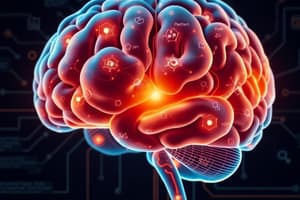Podcast
Questions and Answers
Which of the following is NOT a cognitive bias?
Which of the following is NOT a cognitive bias?
- Confirmation bias
- Anchoring bias
- Chunking (correct)
- Availability heuristic
Which neuroimaging technique uses magnetic fields to measure brain activity?
Which neuroimaging technique uses magnetic fields to measure brain activity?
- PET
- MEG
- fMRI (correct)
- EEG
Which of the following is NOT a cognitive process involved in language processing?
Which of the following is NOT a cognitive process involved in language processing?
- Motor control
- Perception (correct)
- Working memory
- Syntax
- Semantics
Which of the following best describes Vygotsky's sociocultural theory of cognitive development?
Which of the following best describes Vygotsky's sociocultural theory of cognitive development?
Which of the following is NOT a key concept in cognitive psychology?
Which of the following is NOT a key concept in cognitive psychology?
The process of selectively concentrating on specific stimuli while ignoring others is known as:
The process of selectively concentrating on specific stimuli while ignoring others is known as:
Which type of memory holds information for the shortest duration?
Which type of memory holds information for the shortest duration?
Which of the following is NOT a type of long-term memory?
Which of the following is NOT a type of long-term memory?
The ability to focus on specific stimuli while filtering out irrelevant information is called:
The ability to focus on specific stimuli while filtering out irrelevant information is called:
What do Gestalt Principles in perception attempt to explain?
What do Gestalt Principles in perception attempt to explain?
Which of the following is NOT a method used by cognitive psychologists to study mental processes?
Which of the following is NOT a method used by cognitive psychologists to study mental processes?
Which of the following is a principle of Gestalt psychology?
Which of the following is a principle of Gestalt psychology?
Flashcards
Language processing
Language processing
The means by which humans understand and produce language including phonemes, morphemes, syntax, and semantics.
Cognitive biases
Cognitive biases
Systematic errors in thinking that influence judgment and decision-making.
Piaget's stages of cognitive development
Piaget's stages of cognitive development
Four distinct stages where children's understanding evolves qualitatively as they grow.
Bilingualism
Bilingualism
Signup and view all the flashcards
Neuroimaging techniques
Neuroimaging techniques
Signup and view all the flashcards
Cognitive Psychology
Cognitive Psychology
Signup and view all the flashcards
Information Processing
Information Processing
Signup and view all the flashcards
Schema
Schema
Signup and view all the flashcards
Sensory Memory
Sensory Memory
Signup and view all the flashcards
Short-term Memory (STM)
Short-term Memory (STM)
Signup and view all the flashcards
Long-term Memory (LTM)
Long-term Memory (LTM)
Signup and view all the flashcards
Selective Attention
Selective Attention
Signup and view all the flashcards
Language Acquisition
Language Acquisition
Signup and view all the flashcards
Study Notes
Introduction to Cognitive Psychology
- Cognitive psychology is a branch of psychology studying mental processes like perception, attention, memory, language, problem-solving, and decision-making.
- It examines how people acquire, process, and store information.
- This field draws on disciplines including neuroscience, linguistics, and computer science.
- Cognitive psychologists often employ experimental methods for studying mental processes.
Key Concepts in Cognitive Psychology
- Information processing: The mind is treated as an information processor similar to a computer, receiving, processing, and outputting information.
- Schema: Mental frameworks for organizing and interpreting world information.
- Mental representation: How information is encoded in the mind, including imagery, concepts, and language.
- Attention: Focusing on specific environmental aspects while ignoring others; a limited resource.
- Perception: Organizing and interpreting sensory information.
- Memory: Encoding, storing, and retrieving information over time, with three key stages: encoding, storage, and retrieval.
Memory Systems
- Sensory memory: An initial, brief recording of sensory information like iconic (visual) and echoic (auditory) memory.
- Short-term memory (STM): A limited capacity memory system (typically 7 ± 2 items) holding information for a brief period (seconds). Rehearsal aids transfer to long-term memory (LTM).
- Long-term memory (LTM): A vast and relatively permanent memory store. Includes episodic memory (personal experiences), semantic memory (general knowledge), and procedural memory (skills).
Perception and Attention
- Selective attention: Focusing on specific stimuli while filtering out irrelevant information.
- Change blindness: Failing to notice significant changes in the environment.
- Visual perception: Interpreting visual information, including form, depth, and motion perception.
- Gestalt principles: Rules describing how the brain groups elements into organized patterns (e.g., figure-ground, proximity, similarity).
Language
- Language acquisition: How humans acquire language, considering nature and nurture influences.
- Language processing: How humans comprehend and produce language, involving phonemes, morphemes, syntax, and semantics.
- Language development: Stages of language development from babbling to complex sentence construction.
- Bilingualism: The cognitive advantages of learning multiple languages.
Problem-Solving and Decision-Making
- Problem-solving: Strategies and methods for overcoming obstacles and achieving goals, including algorithms and heuristics.
- Decision-making: Cognitive processes used to choose among alternatives. Decision processes can be influenced by cognitive biases and emotions.
Cognitive Development
- Piaget's stages of cognitive development: Four stages where children's understanding of the world changes qualitatively over time.
- Vygotsky's sociocultural theory: Emphasizes social interaction and cultural context in cognitive development.
- Information processing theory of cognitive development: Examining how children's cognitive abilities change with age.
Cognitive Neuroscience
- Relationship between brain activity and cognition: Neuroscientific methods study the neural underpinnings of different cognitive processes.
- Brain areas involved in specific cognitive functions: Specific brain regions are linked to particular cognitive activities.
- Neuroimaging techniques: Methods (e.g., fMRI, EEG) to investigate brain activity associated with cognition.
Cognitive Biases
- Cognitive biases: Systematic errors in thinking affecting judgment and decision-making. Examples include confirmation bias, availability heuristic, and anchoring bias.
- Impact of biases on everyday life: Cognitive biases can result in inaccurate conclusions, poor choices, and adverse consequences.
Studying That Suits You
Use AI to generate personalized quizzes and flashcards to suit your learning preferences.




